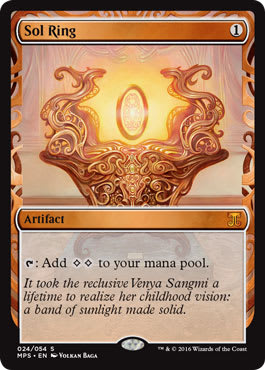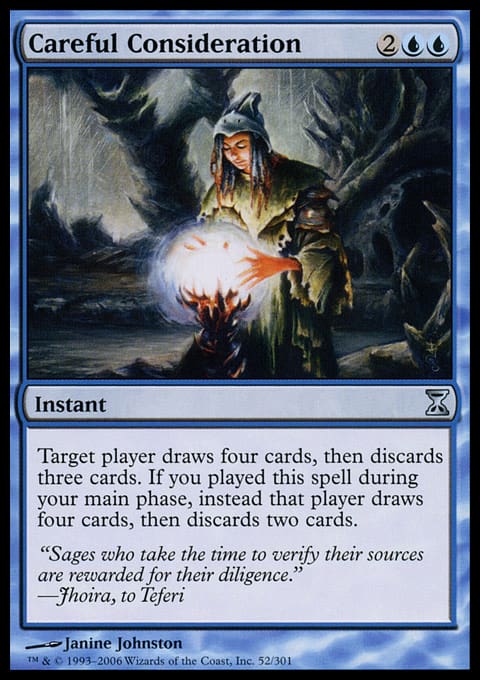I started examining the process of writing Magic articles because it fascinated me. I have been enamored with this game for nearly twenty years, and the musings on Magic played a huge role in my ability to connect and understand the game. I brute-forced my way through the rule book after I had observed grade-school colleagues slinging cardboard on rough asphalt of the Brooklyn schoolyard. Sol Ring does not hold up as well as a pair of Air Jordans under these conditions. Reading is truly fundamental to the love of Magic. When I was simply a consumer of content, it was my chance to go down the rabbit hole and gain an understanding of concepts that may never come up in my own experience.
When I switched sides and started writing, I had a revelation. The act of creation is not an isolated one. Reading can be done in private, especially in the era of smart phones. Putting words down involves the populace. Writing can be said to be the greatest expression of one’s ego, and authors should write for themselves first; yet, without an audience to read the words, is there a point in creation?
Regardless of the answer to this existential proposition, consuming Magic content is a participatory event. Therefore, today, we are going to be taking a break from discussing the art of writing Magic articles and we will instead talk about being a responsible reader.
The first step, of course, is deciding which articles to read. There is an abundance of content in the modern era, and it is a challenge for even the most dedicated gamer to read them all. So, how does one choose which articles to consume?
It is easy to say that someone should only read about the things of interest. That is poor advice. Even though there are nearly infinite ways to play Magic, they all use the same basic rule set and game pieces. Therefore, it makes sense that reading about any aspect of the game can improve one’s appreciation of the other attributes. You never know if the article on the latest Standard will contain the sweet interaction you have been looking for to improve your Commander deck.
Mark Rosewater discusses this concept often. He forces himself to design cards from different starting points as a way to stretch his neural pathways. Reading articles outside of the comfort zone can make it easier to make cognitive leaps in the future. This is only one reason that a responsible reader soaks up as much content as possible.
However, it is okay to play favorites. If after reading a certain author for a few weeks, that author has nothing of interest for you, that is perfectly okay. Stop reading; time is precious, and spending it on something you do not enjoy just creates wasted moments. At the same time, give new writers chances to find their footing. Not everyone’s first article—or first ten articles—is going to be a work of genius. Finding a voice takes time and feedback. (More or this later.)
The first step to being a responsible reader, then, is to have an open mind. This is what gets you to click the content in the first place. The second step is to attempt complete understanding. That one’s slightly more difficult.
I have made reference to Roland Barthes’s “Death of the Author” before. A foundational thought behind this piece is that once an author completes a work and puts it out into the world, his or her original intent no longer matters. In some ways, it is impossible to fully comprehend what the author was attempting to convey (since words are imperfect vehicles). Strong writers will select the best possible words and lose the fewest in translation. The key here is to read with intent.
There are two main reasons we consume Magic content. The first is entertainment, and the second is information. We can hope the two of these will meet and that the actual reading is enjoyable. This makes the information easier to absorb and internalize. If the concepts are tough, read them again. The goal is not to finish the article in record time, but rather to gain an intimate knowledge of what the creator was striving to say.
The pursuit of this understanding is an activity. The base reading of an article should provide the foundation of understanding. Seeing unfamiliar concepts should result in an exercise in the usage of a solid search engine in order to research unfamiliar concepts. Such a step is important for newcomers to the game, as it can allow one to see the links and evolution of the world of Magic. The same process might not be necessary for those who have been playing the game for a sold length of time. Just as there are certain high-level play concepts that can be internalized and shortcut, so can the step of deeper understanding. Some can do this on pure memory and mental fortitude while others use the bookmark tab.
While it’s not for everyone, I tend to read heavier articles with a piece of paper and pen at the ready. I jot down notes, much as I used to in lectures, and I then use those notes as the focal points of my second—or third—reading. If there are points I fail to recognize, I proceed to Google and round out my knowledge base. Once this is done, if I still fail to fully understand the article, I head to the comments.
And here we come to one of the stickier points of being a responsible reader. The comment section can be a bane or a boon for writers. After a recent Reid Duke article, no one less than Paulo Vitor Damo da Rosa took to Twitter to bemoan the dearth of reaction to the piece. I understood where the Hall of Famer was coming from. Writers write for themselves, and they write for the audience, but many also pursue their craft to improve. Without feedback, both praise and critique, there is less information on areas of strength and room for growth.
The previous point appears to be in conflict with Barthes’s assertion. How can a commenter, who can’t fully understand the creator’s pure intent, provide valuable feedback?
Yet, this is the exact reason a conscientious researcher must reach out and provide his or her own notes. The notes and feedback a writer receives helps him or her refine his or her work in the future and help shrink the gap between the Platonic Ideal of the article and what is actually reflected on the shadow of the screen.
Let us be realistic for a moment. The comments sections of many corners of the Internet are vile places full of casual hate, racism, homophobia, misogyny, and other less-than-savory practices. By following the words of Mr. Vonnegut above, we can see how to craft the best possible comment. This does not mean one must blindly praise but rather be constructive in the criticism. Being kind is not being soft, it is understanding that the person who created the piece you just consumed—that we can hope brought you joy—is in fact a human being. To this end, if you read an article and derived enjoyment, then please, like the article on Facebook if it is possible. I speak from experience in saying that seeing that like count climb is some of the easiest feedback to understand—you like it, and that is a very good thing.
If you want to write a longer comment of agreement or dissent, go back to the source material. While you do not have to quote, directly referencing specific parts of the article can make it easier for the author to respond. Feel free to engage the person behind the byline through his or her public persona, whether that is Twitter, Facebook, the comments, or another avenue. A responsible reader engages in the act of creation.
I can only speak for myself, but I create Magic content because I have something to say. Not only that, but I believe the community can benefit from hearing these ideas. I know that I also strive to improve my craft with each keystroke. Ask my editors—I crave feedback. I imagine many other writers are the same. Help out me and other inky wretches:
- Have an open mind.
- Attempt complete understanding.
- Engage in the act of creation.
And don’t forget: Be kind.




























